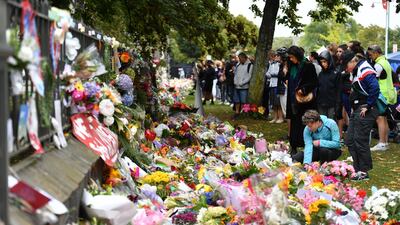A Syrian father and his two sons, who had found refuge in New Zealand last year after fleeing their homeland, were among the victims of Friday’s terrorist attack while praying at Al Noor Mosque in Christchurch.
Khaled Mustafa, 46, was killed alongside his son Hamza, 16, who was initially listed as missing, when the bullets rang out on Friday afternoon. His son Zaid, 13, was severely injured and is still in hospital.
At least 50 people died in the attacks on Friday, including 42 at the Al Noor Mosque, where the shooter began his massacre.
Family spokesman Ali Akil told The National that Zaid had undergone a six-hour surgery and his condition was now stable. Mr Mustafa's wife and young daughter were not at the mosque with them. His wife was currently being supported by a family friend, and was in "a lot of pain".
The family had arrived in Christchurch in late 2018, having fled Syria and living in a refugee camp for years.
"This is a family who had managed to survive the atrocities in Syria, they then managed to escape to Jordan. They ended up in refugee camps in Jordan for a number of years and then they finally were able to come to New Zealand as their final safe haven destination," Mr Akil said.
Neither Zaid, or Mr Mustafa's young daughter, know of their father and older brother's death yet. His wife is "shattered and frustrated and devastated, and every single word of pain you can think of applies to her", Mr Akil said.
"She's left alone to deal with the fact she has lost her beloved husband and beloved son, and at the same time she needs to deal with her younger beloved son in hospital. Her little daughter needs to be taken care of too."
Mr Akil is also the founder of the Syrian Solidarity New Zealand group, a charity organisation dedicated to helping refugees who come to the country from Syria, and educating the public about their nation's plight.
He estimates there is probably "much less than 1,000" Syrian refugees who have resettled in New Zealand, so it was a huge blow for the community. Friday also marked eight years since the Syrian revolution began.
"At the end of the day, it's a very small community. It is [tight-knit], but it's hard to keep in touch as everyone comes in and is placed in different places. They start building their own community wherever they are," he said.
In 2015, as a response to the Syrian refugee crisis, the National Party-led government agreed to prioritise refugees from Syria and to take in 750 refugees from the country over three years. New Zealand's refugee quota for all countries is currently capped at 1,000 people a year.
When asked if he still considered New Zealand a safe place for refugees, Mr Akil said, "definitely not".
"To be honest, New Zealand is, was and will always be better than the rest of the Western world in terms of the levels of racism and bigotry and right-wing extreme terrorism. However, unfortunately, over the past few years there has been an increase of all of these as a result of the increase worldwide," Mr Akil said.
"My concern goes to the wider [migrant] community. Although it has hit the Muslim community, this terrorist is anti-migrants altogether."
He called for the death penalty to be introduced to New Zealand for mass murderers.
"If this scumbag is able to live peacefully in prison then that is not a deterrent. You could see how completely careless he was. He doesn't care."
Mr Akil said his wife had been "terrified" since the attacks and was "terrified to take my kids to school on Monday, especially because they go to a Muslim school".
"And that's only one personal story. The impact of this can be so wide-ranging," he said.
Preventative measures would be important for New Zealand's Muslim community going forward, he said.
Mr Akil said those such as Senator Fraser Anning in Australia, who drew outrage when he blamed the Christchurch attacks on the rise of the Muslim population in a series of tweets and a press release, were responsible for the widespread "increase of hatred".
"Such people need to be removed from parliament. They do not represent the people of Australia or New Zealand, or any other country. They are the source of bigotry and racism.
"There's a big trend globally where racism and bigotry and extreme right-wing white supremacist terrorism is rising and its hit us in New Zealand, and to fix that the world needs to come together and redefine what terrorism is and how it can be confronted.
"Yes the guy came from overseas, and yes he doesn't belong, but we can't deny that the problem doesn't exist," Mr Akil said.

